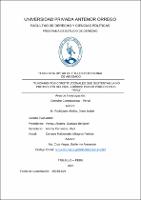| dc.contributor.advisor | Cruz Vegas, Guillermo Alexander | |
| dc.contributor.author | Rodríguez Alvildo, Diana Isabel | |
| dc.creator | Rodríguez Alvildo, Diana Isabel | |
| dc.date.accessioned | 2023-12-19T22:37:11Z | |
| dc.date.available | 2023-12-19T22:37:11Z | |
| dc.date.issued | 2023 | |
| dc.identifier.uri | https://hdl.handle.net/20.500.12759/14971 | |
| dc.description.abstract | La presente investigación subyace del problema de entender que los tipos penales, deben sustentarse en función de un bien jurídico protegido, es decir, no se pueden tipificar con conductas que simbólicamente se encentren recogidas en el catálogo penal dentro del acápite referido a la protección de un bien jurídico, sino que en realidad deben proteger ese bien jurídico, de lo contrario se lesionaría el principio de lesividad, además se generaría inseguridad jurídica, pues para el caso que se analiza, el pudor público, es un concepto relativo y muy gaseoso, además que no se vulnera tampoco la libertad e indemnidad sexual. en base a ello se ha señalado como título de la investigación la siguiente: “FUNDAMENTOS CONSTITUCIONALES QUE SUSTENTAN LA NO PROTECCIÓN DEL BIEN JURÍDICO PUDOR PÚBLICO EN EL PERÚ”.
En relación a la temática antes señalada, se consideró tomar como enunciado del problema, el siguiente: ¿Cuáles son los fundamentos constitucionales que sustentan la no protección del bien jurídico pudor público en el Perú?, además ese estableció como objetivo general el siguiente” Determinar cuáles son los fundamentos constitucionales que sustentan la no protección del bien jurídico pudor público en el Perú”.
Luego de hacer el análisis en función con los métodos que se han considerado y teniendo como materiales a la doctrina y, en especial la jurisprudencia de la Corte Suprema, se llegó a señalar que “los fundamentos constitucionales que sustentan la no protección del bien jurídico pudor público en el Perú son; la seguridad jurídica, el principio de lesividad, además la manifestación lex certa, y los bienes jurídicos libertad e indemnidad sexual. | es_PE |
| dc.description.abstract | The present investigation underlies the problem of understanding that criminal types must be based on a protected legal right, that is, they cannot be typified with behaviors that are symbolically included in the criminal catalog within the section referring to the protection of a legal right, but in reality they must protect that legal right, otherwise the principle of harmfulness would be injured, in addition legal uncertainty would be generated, because in the case that is analyzed, public modesty is a relative and very gaseous concept, in addition that freedom and sexual indemnity are not violated either. based on this, the following has been indicated as the title of the investigation: ““CONSTITUTIONAL FUNDAMENTALS THAT SUPPORT THE NON-PROTECTION OF THE LEGAL GOOD PUBLIC SHADE IN PERU““.
In relation to the aforementioned subject, it was considered to take the following as a statement of the problem: What are the constitutional foundations that support the non-protection of the legal right of public modesty in Peru?, In addition, it established the following as a general objective ““Determining What are the constitutional foundations that support the non-protection of the legal right of public modesty in Peru?
After carrying out the analysis based on the methods that have been considered and taking as materials the doctrine and, especially the jurisprudence of the Supreme Court, it was pointed out that ““the constitutional foundations that support the non-protection of the legal right modesty public in Peru are; legal certainty, the principle of harmfulness, in addition to the lex certa manifestation, and the legal rights of freedom and sexual indemnity. | es_PE |
| dc.description.uri | Tesis | es_PE |
| dc.format | application/pdf | es_PE |
| dc.language.iso | spa | es_PE |
| dc.publisher | Universidad Privada Antenor Orrego | es_PE |
| dc.relation.ispartofseries | T_DERE_634 | |
| dc.rights | info:eu-repo/semantics/closedAccess | es_PE |
| dc.rights.uri | https://creativecommons.org/licenses/by/4.0/ | es_PE |
| dc.source | Universidad Privada Antenor Orrego | es_PE |
| dc.source | Repositorio Institucional - UPAO | es_PE |
| dc.subject | Pudor Publico | es_PE |
| dc.subject | Bien Juridico | es_PE |
| dc.title | Fundamentos constitucionales que sustentan la no protección del bien juridico pudor público en el Perú | es_PE |
| dc.type | info:eu-repo/semantics/bachelorThesis | es_PE |
| thesis.degree.level | Título Profesional | es_PE |
| thesis.degree.grantor | Universidad Privada Antenor Orrego. Facultad de Derecho y Ciencias Politicas | es_PE |
| thesis.degree.name | Abogado | es_PE |
| thesis.degree.discipline | Derecho | es_PE |
| dc.subject.ocde | https://purl.org/pe-repo/ocde/ford#5.05.00 | es_PE |
| renati.advisor.orcid | https://orcid.org/0000-0002-9119-5397 | es_PE |
| renati.author.dni | 72554431 | |
| renati.advisor.dni | 43414679 | |
| renati.type | https://purl.org/pe-repo/renati/type#tesis | es_PE |
| renati.level | https://purl.org/pe-repo/renati/level#tituloProfesional | es_PE |
| renati.discipline | 421016 | es_PE |
| renati.juror | Vereau Alvarez, Gustavo Benjamin | |
| renati.juror | Atoche Coronado, Raúl | |
| renati.juror | Campos Maldonado, Milagros Patricia | |
| dc.publisher.country | PE | es_PE |




